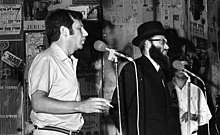Amnon Rubinstein
Amnon Rubinstein (Hebrew: אמנון רובינשטיין, 5 September 1931 – 18 January 2024) was an Israeli legal scholar, politician and recipient of the Israel Prize.
He is referred to as the “founding father of Israeli Constitutional Law”[1] In later life he was dean of the Interdisciplinary Center (IDC) in Herzliya and a patron of Liberal International.
In the early 1950s, he was a member of the Volunteers' Row, a public organization aimed at fighting corruption and helping new immigrants.
After his military service, Rubinstein studied in law, economics, and international relations at the Hebrew University of Jerusalem.
[7] His doctoral dissertation, titled "Void and Voidable Actions in Administrative Law", was published as a book by Oxford University Press.
At the age of 25, during his studies, Rubinstein married Roni a fellow student and granddaughter of Jacob and Perla Shlush, founders of Tel Aviv.
Dash won 15 seats in the 1977 elections, but did not achieve its aim of being a decisive political force as Menachem Begin formed a government without its support.
In 1999, Avraham Burg, the Speaker of the Knesset, received a false message from Zalman Shoshi claiming that Rubinstein had died.
Under his leadership, the Ministry of Education increased the matriculation pass rate by implementing measures such as eliminating external exams for some core subjects.
[18] This initiative included both state-funded institutions, such as the Tel Aviv–Yafo Academic College, and privately funded ones, like the Interdisciplinary Center Herzliya.
Following the signing of the Geneva Initiative by then-Meretz leader Yossi Beilin, Rubinstein left Meretz, opposing its compromise on the Law of Return.
He co-initiated a petition endorsing these reforms, stating: "My aim was to dispel the impression that the professors in the universities had created, as if the entire academia opposed Friedmann's initiatives.
Through his deep academic writing and diverse public activities, he promotes democracy, equality, and human rights.
Few can match his contribution to the state of Israel as Prof. Amnon Rubinstein – as a public figure, as a member of the legislative and executive branches, as a researcher, and as a brilliant jurist.
[26] From 1964 until 2004, he was a member of the editorial board of Haaretz and a regular contributor, focusing on issues of religion and state and addressing antisemitism, particularly that which he attributed to the political left in Europe.
[29] Rubinstein hosted a radio program on Kol HaMusika, A Musical Morning for Truck and Bus Drivers, from 2014 to 2015.
[30] Rubinstein wrote extensively on the investigation and prosecution of public figures in Israel, arguing that enforcement bodies wield excessive and unchecked power over elected officials.
[32][33] In 2020, Rubinstein participated in The Future Archive, a documentation project highlighting the generation of intellectuals who significantly influenced early Israeli culture.

